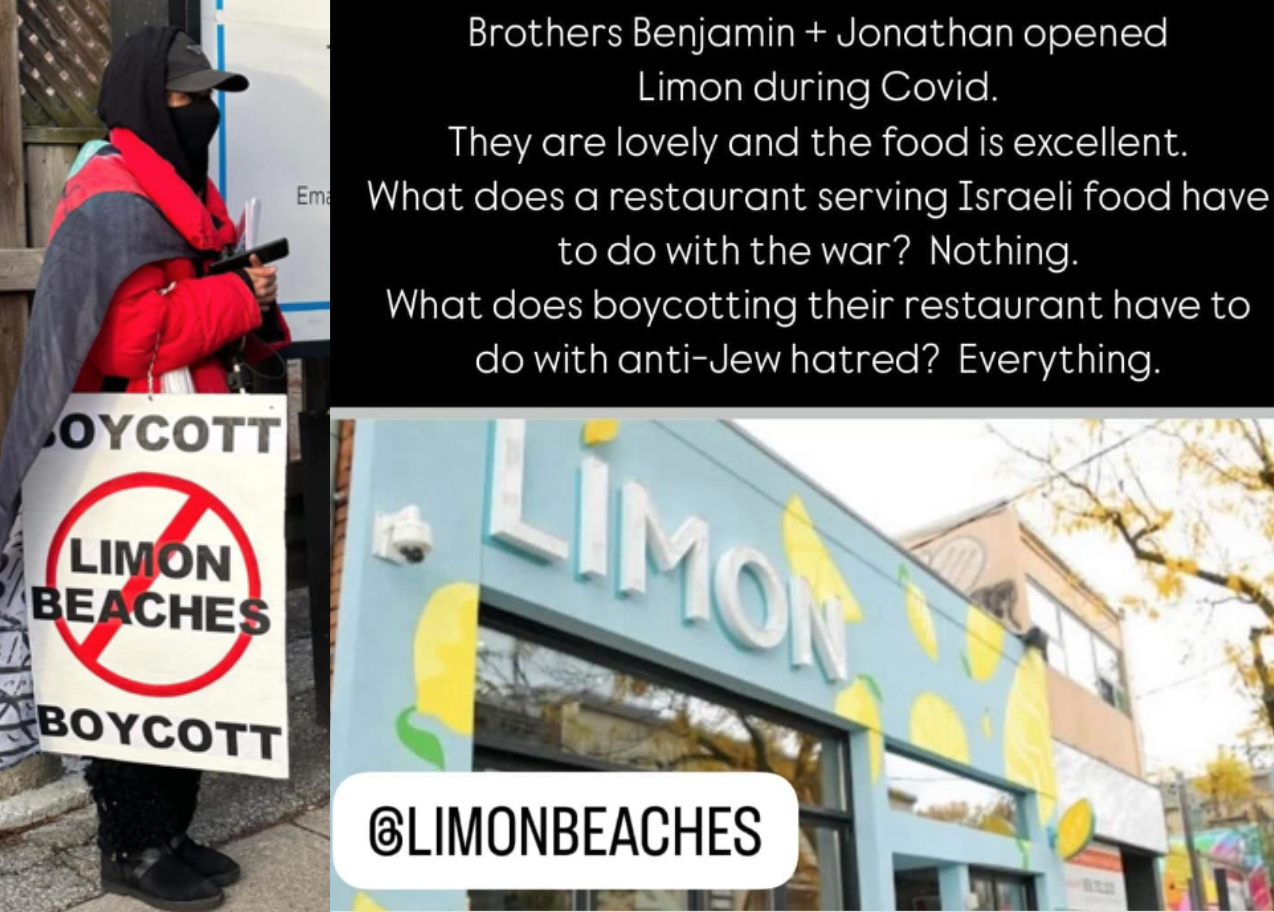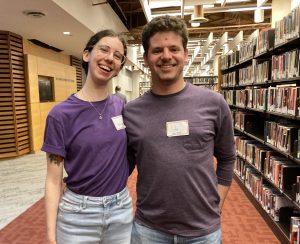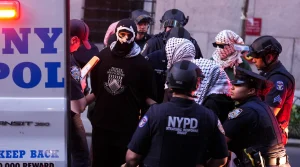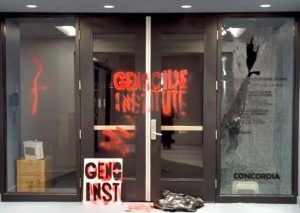Updated on Dec. 19: Toronto city council voted 17-5 to ask staff to draft a bylaw responding to demonstrations—including incorporating “bubble zones” that would keep protests away from schools, community centres and places of worship. Mayor Olivia Chow voted in favour of the motion.
Council passed all five of the recommendations from a staff report on the city’s response to demonstrations, late on Dec. 18. These included a one-time $2.5 million allocation for security grants to protect buildings from car attacks with physical barriers such as bollards. The city manager was directed to consult the Toronto Police Service and the community, as well as incorporate analysis of Charter rights protections, and present a bubble zone bylaw to the city’s executive committee in the first quarter of 2025.
Toronto’s city council will re-examine how it responds to demonstrations—including incorporating “bubble zones”—as part of a new bylaw that would keep protests away from schools, community centres and places of worship. Council is also looking at adding $2.5 million for security grants to protect such buildings from car attacks. The issue will be discussed in council on Dec. 17.
If approved, the city manager would develop a bylaw “that supports the City’s commitment to keeping Toronto safe from hate and respects Charter jurisprudence that addresses impacts of demonstrations on the public and on access to publicly accessible spaces,” the report states.
City staff will consult the Toronto Police Service and the community. The bylaw would be presented to council’s executive committee by the first quarter of 2025.
A one-time operating grant of $2.5 million for items such as security bollards would be earmarked in the 2025 budget.
Council had considered enacting bubble zone legislation in May, but that motion was narrowly defeated in a vote, and referred to the city manager to develop an action plan.
City staff will also review relevant municipal bylaws in nearby Vaughan, Ont., and in Calgary, which “address impacts of demonstrations on the public and on access to publicly accessible spaces.”
Toronto Mayor Olivia Chow confirmed in a statement to The CJN that she supports the item.
“Toronto has seen a distressing rise in reported hate crimes including an acute rise in antisemitism. Hateful acts have no place in Toronto. The Toronto Police Service, as the primary responder, is working to maintain public safety and uphold the right to demonstrate lawfully,” wrote Chow.
“I welcome this staff report and the upcoming discussion at City Council to determine what more we can do as a city to foster safety and belonging across communities. I look forward to supporting the very immediate recommendation of a $2.5 million grant program to protect our most vulnerable people and community spaces from hate-motivated attacks.”
The report also calls for a review of permitting policies related to “demonstrations on publicly accessible City property,” which currently do not require a permit.

Toronto city councillor James Pasternak, of York Centre, was one of the early proponents of the previous bylaw that was defeated in May. He says the current item for action took “many months” to develop since the Oct. 7, 2023, Hamas attacks on Israel. Just days after the attack, there were protests at Nathan Phillips Square, outside City Hall, by those who outwardly supported Hamas, which has been designated as a terrorist entity by the federal government.
Pasternak has been critical of the city’s response so far, and says that it’s been a “battle” to get to this point.
“The city needs to take a principled stand, to uphold our current laws, to enforce the city of Toronto hate rallies policy… to respond to the hate rallies that are on our streets that were destabilized in the city, that clearly had many elements that went way over the line,” he said.
“I’ve observed some of them: swastikas, Hitler salutes… calling for intifada and the genocide of Jews. They were illegal, they were despicable, and the response by the city of Toronto has been inadequate.”
He says that police have been extremely responsive when it comes to protecting Jewish events, but that “they’re working under very difficult circumstances with a lack of political support and very thin resources,” and have requested increased support from the Ontario Provincial Police and the Royal Canadian Mounted Police in certain cases.
He calls it deeply frustrating that Toronto appeared to lag behind other municipalities in advancing no-protest zone bylaws.
The motion defeated in council in May would have asked the provincial government to look at creating a law in Ontario to protect vulnerable buildings that would include synagogues, schools and Jewish community centres.
“That [was] probably the nastiest fight floor fight I have seen in the 14 years I’ve been at City Hall. The mayor vigorously fought that, and then we were left with a vacuum.
“We really were one vote away, and all it was, was a benign request for the province to consider passing legislation that would protect places of worship, faith-based schools and faith-based cultural institutions, such as the Holocaust Museum or the Aga Khan [Museum]. So it was for all faiths, and it met enormous opposition, with a bizarre argument that this would affect Charter rights, and that this would affect labour picketing… [that was] both misleading [and] incorrect.
He says the new bylaw proposal, which won’t come to council until 2025, still amounts to “baby steps” when the situation calls for greater urgency.
“To wait another three months is deeply frustrating,” he says. “There’s no guarantee we’re going to get the bubble zones.”
My Administrative Inquiry regarding updates on the Action Plan to Keep Toronto Safe from Hate will be considered at City Council next week. Further action must be taken to address this significant issue. https://t.co/sY4ftrqwaa pic.twitter.com/2gU2pmVn0c
— James Pasternak (@PasternakTO) December 12, 2024
“We don’t know whether we’re going to get the desperately needed collaboration with the other levels of government,” including the RCMP and OPP, he said.
He pointed to an incident where protesters interrupted and managed to cancel a dinner with Prime Minister Justin Trudeau and visiting Italian Prime Minister Giorgia Meloni, in 2023, at the Art Gallery of Ontario.
RCMP had jurisdiction for security in that case, because it involved heads of state, he said.
“It was a total fiasco, with a small number of hooligans blocking the entranceway, and no real attempt to create a security corridor, either for the prime minister of Italy or our own prime minister. So you had hundreds of people in there for a state dinner which was cancelled, and it made international headlines, and it was very embarrassing for the city of Toronto.
“We need the provincial and federal governments to help backstop Toronto Police Service. We cannot manage the situation with the thin resources we have,” he said.
He also called for the enforcement of current laws, and for the ministry of the attorney general “to stop dropping charges that police are laying.”
“Unless there’s that collaboration among the three levels of government, this is just going to be endless. The approach of, ‘This will pass,’ and de-escalation will not work when it comes to the groups involved in this chaos across our city. The time for waiting it out and keeping everybody apart and sending everyone home… Clearly, you know, after 14 months, that has not worked.”
Councillor Josh Matlow, of St. Paul’s, voted against the bylaw motion in May, but instead moved the motion for the city manager to develop an action plan.
Matlow said he’ll support the item for consideration at council Dec. 17, and emphasizes that the reason he voted against the previous bylaw had to do, in large part, with not referring the matter to Ontario Premier Doug Ford’s government to create a law.
He has previously told The CJN that the motion at council in May wouldn’t have stopped, for example, the two separate incidents of gunfire at Bais Chaya Mushka, a Jewish girl’s school, when attackers shot at the school overnight.
“It’s already against the law to shoot at a school,” said Matlow.
The safety zone legislation for vulnerable buildings doesn’t address some of the most concerning kinds of incidents, like demonstrations harassing Jewish-owned businesses, or vandalism and antisemitic graffiti, including on posters for the hostages in Israel, which he says has been a reported concern in his district.
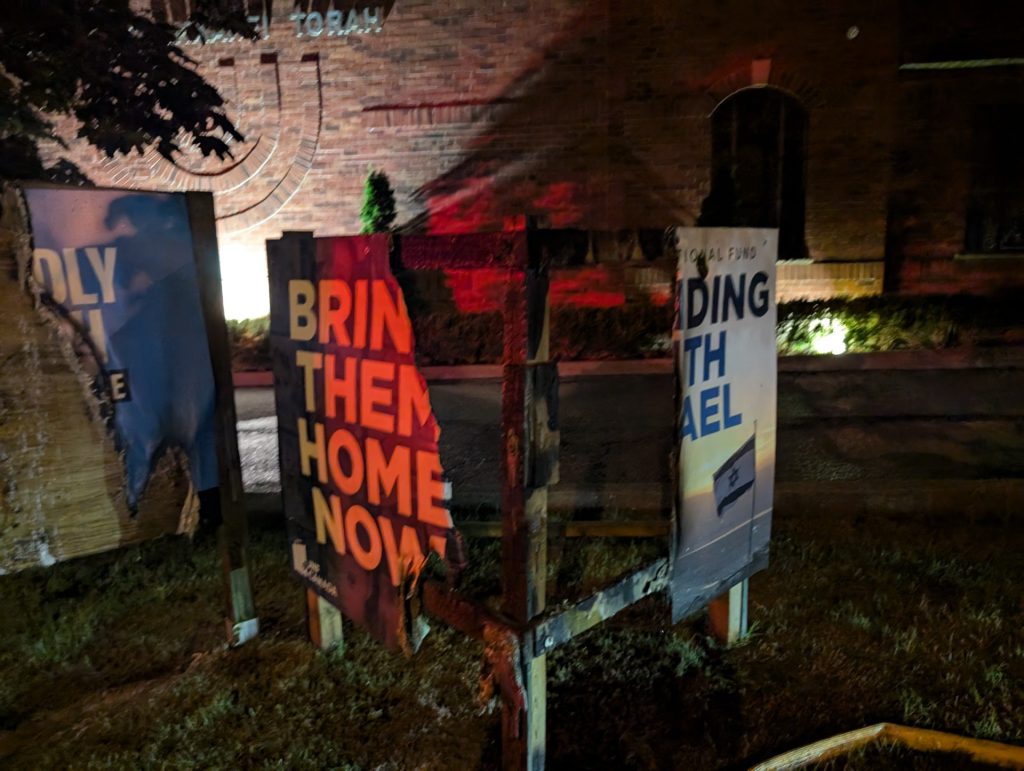
“Our problem as a Jewish community is not having protesters standing in front of synagogues on a Saturday morning asking us not to pray,” he said. “It’s about anywhere [members of the] Jewish community are being harassed, and intimidated. It comes in lots of forms.”
The bylaw will need to address, in particular, one specific element of demonstrations.
“It’s about behaviour at these protests more than about protesting… [we have to] protect people’s Charter rights, but also address hateful intimidating behaviour at protests.”
He supports the infrastructure grant and mentioned that street furniture such as bicycle racks could be part of planning discussions depending on the needs and physical locations of individual buildings.
Matlow commended the increased communication and collaboration between city staff and Toronto police in responding to protests so far, including what he says has been an increase in “intelligence sharing,” cooperation and collaboration between city departments and agencies includes TPS, its Hate Crimes Unit and city staff tasked with emergency management.
Councillor Brad Bradford, who moved the original council motion for the safety zone bylaw, says that since Oct. 7, 2023, the Jewish community has been calling on city administrators to do more to address the uptick in hateful incidents.
“The community… has been subjected to harassment, violent intimidation, and significant rise of antisemitism,” he said.
Bradford mentioned the Miles Nadal Jewish Community Centre in downtown Toronto, which several councillors and Chow have also cited, as an example of a Jewish building they want to ensure is protected.
“It’s unfortunate that we need more hardened infrastructure to protect these [vulnerable] facilities, and it’s been promised for many months, and we haven’t yet seen it. So I’m glad to see that that’s moving forward, but it’s nowhere near the urgency that is deserved and required.”
In his own Beaches-area constituency in the city’s east end, an Israeli restaurant, Limon, was targeted with threatening, harassing phone messages and a protest. The Chabad of Danforth-Beaches has seen hostage signs regularly vandalized, he said.
“They continually have the ‘Bring Them Home’ sign taken down, ripped down, stolen, thrown out. We’ve seen that numerous times over the past [15] months. They’re a resilient community, but it doesn’t send a very positive message,” said Bradford.
Michelle Stock, vice-president in Ontario for the Centre for Israel and Jewish Affairs, wrote in a statement that some of the demonstrations “filled with hateful chants, signs and antisemitic rhetoric” have left Jewish residents “fearful of attending places of worship, schools and community centres.”
Stock, who met with Mayor Chow in late October, says it’s about time that council acted.
“Although our community has waited far too long to see this, we are pleased to see that the city has finally decided to tackle this serious issue and will be discussing a policy framework regarding the city’s response to demonstrations at next Tuesday’s council meeting,” she wrote.
“Our Toronto community supports the bylaw option similar to those employed in the City of Vaughan. However, we caution that it should also be adjusted to reflect some of the limitations that we saw this past week at a protest outside the Beth Avraham Yoseph of Toronto synagogue. Regardless, protecting places of worship and schools from protests within a 100-metre buffer zone is 100 percent necessary.”
She added that it will be key to see how the final bylaw addresses the “obvious limitations to how other bylaws have been implemented.”
At a protest at the BAYT synagogue on Dec. 9, the 100-metre buffer zone bylaw was not enforced. Vaughan Mayor Steven Del Duca has said he will consult with police and others as to what occurred.
I have taken several days to comment publicly on the protest that took place this past Monday at the BAYT synagogue in our community because I wanted some time to reflect on what occurred before reacting.
— Steven Del Duca (@StevenDelDuca) December 13, 2024
The bylaw may be a hint of things to come at other levels of government, according to a town hall last week in Montreal featuring Deborah Lyons, Canada’s envoy on Holocaust remembrance and combatting antisemitism.
At the event, Liberal MP Anthony Housefather, the special government advisor on antisemitism, said that Lyons and CIJA supported a federal version of bubble zone laws, making it a criminal infraction to block access to a school, place of worship or community centre.
With files from Ellin Bessner
- PODCAST: ‘Bubble legislation’ back on the ballot: Two Toronto councillors explain what’s changed since May
Author

Jonathan Rothman is a reporter for The CJN based in Toronto, covering municipal politics, the arts, and police, security and court stories impacting the Jewish community locally and around Canada. He has worked in online newsrooms at the CBC and Yahoo Canada, and on creative digital teams at the CBC, and The Walrus, where he produced a seven-hour live webcast event. Jonathan has written for Spacing, NOW Toronto (the former weekly), Exclaim!, and The Globe and Mail, and has reported on arts & culture and produced audio stories for CBC Radio.
View all posts

